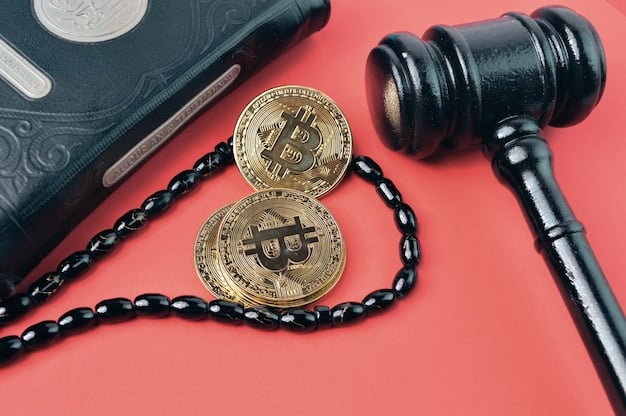Regulatory Impact on Altcoins: SEC Stance on Security Tokens

The regulatory impact on altcoins, particularly concerning the SEC’s evolving stance on security tokens, poses significant challenges and opportunities for the cryptocurrency market, influencing their classification, compliance requirements, and overall market behavior.
The world of altcoins is constantly evolving, and understanding the regulatory landscape is crucial for investors and developers alike. The regulatory impact on altcoins: navigating the SEC’s evolving stance on security tokens is a topic of vital importance, and exploring it will help you grasp the potential pitfalls and prospects within this burgeoning sector.
Understanding Altcoins and Security Tokens
Before diving into the regulatory complexities, it’s essential to understand the basic definitions of altcoins and security tokens. This sets the foundation for comprehending how the SEC’s regulations affect these digital assets.
What are Altcoins?
Altcoins, short for alternative cryptocurrencies, are any cryptocurrencies other than Bitcoin. They can vary widely in their underlying technology, consensus mechanisms, and intended use cases.
- Purpose: Altcoins aim to improve upon Bitcoin, offering greater scalability, faster transaction speeds, or enhanced privacy features.
- Examples: Ethereum, Ripple (XRP), Litecoin, and Cardano are well-known examples of altcoins.
- Market Impact: Altcoins contribute to the diversity and innovation within the cryptocurrency ecosystem.
Defining Security Tokens
Security tokens represent ownership in an existing asset, such as stocks, bonds, or real estate. They are subject to securities regulations because they offer investors rights to profits, revenue share, or other forms of financial return, akin to traditional securities.
- Compliance: Security tokens must comply with securities laws, including registration requirements and exemptions.
- Benefits: They offer potential benefits such as fractional ownership, increased liquidity , and automated compliance.
- Regulatory Scrutiny: The SEC closely scrutinizes security tokens to protect investors and ensure compliance with regulations.
Understanding the difference between altcoins and security tokens is the first step in navigating the regulatory landscape. Altcoins often operate in a grey area, while security tokens are more clearly defined and regulated.
The SEC’s Role in Regulating Cryptocurrencies
The Securities and Exchange Commission (SEC) plays a pivotal role in regulating cryptocurrencies, particularly when they are deemed securities. The regulatory landscape is complex, and understanding the SEC’s approach is crucial for anyone involved in the altcoin market.
Defining Securities Under SEC Regulations
The SEC uses the Howey Test to determine whether a digital asset is a security. This test, derived from the 1946 Supreme Court case *SEC v. W.J. Howey Co.*, assesses whether an investment contract exists based on:
- Investment of Money: An investor provides capital.
- Common Enterprise: The investment is pooled with others.
- Expectation of Profits: The investor expects to profit primarily from the efforts of others.
SEC Enforcement Actions Against Altcoins
The SEC has taken enforcement actions against numerous altcoins and cryptocurrency projects, alleging unregistered securities offerings. These actions highlight the SEC’s commitment to enforcing securities laws in the digital asset space.
- Ripple (XRP): The SEC sued Ripple Labs, alleging that XRP was offered as an unregistered security.
- Telegram (TON): The SEC halted Telegram’s TON blockchain project, arguing that its token sale was an unregistered securities offering.
- Block.one (EOS): The SEC settled with Block.one for conducting an unregistered initial coin offering (ICO) of EOS tokens.

The SEC’s involvement in regulating cryptocurrencies is geared towards ensuring investor protection and maintaining market integrity. Understanding the criteria the SEC uses to classify digital assets as securities is critical for compliance within the altcoin ecosystem.
Navigating the Regulatory Maze: Key Considerations for Altcoins
Navigating the regulatory landscape for altcoins requires careful consideration of various factors. Compliance is essential to avoid legal pitfalls and ensure long-term sustainability.
Compliance Requirements for Altcoins
Altcoins that are classified as securities must comply with securities laws, including registration requirements. However, registration can be costly and complex, leading many projects to seek exemptions.
- Regulation D: Allows companies to raise capital through private placements without registering with the SEC.
- Regulation A+: Enables small and medium-sized companies to raise up to $75 million from the public.
- Regulation CF: Permits crowdfunding for startups and small businesses, allowing them to raise up to $5 million.
Impact on Altcoin Development and Innovation
Regulatory uncertainty can stifle innovation and development in the altcoin market. Clear and consistent regulations are needed to foster growth while protecting investors.
Projects must find ways to navigate the existing regulations without diminishing enthusiasm for innovation. Engagement with regulatory bodies and legal experts is crucial. This ensures compliance while pushing for realistic and fair regulatory outcomes.
Navigating the regulatory maze requires a proactive approach. By understanding and adhering to compliance requirements, altcoins can still drive innovation and gain trust in the market.
The Evolving Stance on Security Tokens
The SEC’s stance on security tokens is continually evolving, influenced by technological advancements and market developments. Understanding these trends is essential for projects and investors.
Current SEC Guidelines on Security Tokens
The SEC has provided some guidance on security tokens but has not established a comprehensive regulatory framework. This lack of clarity creates challenges for market participants.
Industry specialists often look to SEC statements and enforcement actions. These indirect sources helps guide their understanding of compliance expectations for security tokens. Projects must consult with legal counsel to navigate this complex environment.
Future Regulatory Outlook for Security Tokens
The future regulatory environment for security tokens is uncertain but likely to become more defined. Clarity and consistency will be crucial for the growth of the security token market.
- Potential for Clearer Guidelines: The SEC may issue clearer guidelines or regulations specifically addressing security tokens.
- Increased Adoption: As regulations become clearer, institutional investors may become more comfortable participating in the security token market.
- Technological Advancements: Developments in blockchain technology could lead to new regulatory challenges and opportunities.

The SEC’s evolving stance on security tokens reflects the broader challenges and opportunities in regulating digital assets. Keeping abreast is vital for anyone navigating this space.
Challenges and Opportunities for Altcoins Under SEC Scrutiny
The regulatory scrutiny imposed by the SEC presents both challenges and opportunities for altcoins. By understanding these dynamics, altcoins can strategically position themselves for success.
How Regulation Affects Market Liquidity
Regulation can significantly impact the liquidity of altcoins. Increased regulatory scrutiny may lead to reduced trading volume and market participation, especially if projects are found to violate securities laws.
Some exchanges might delist altcoins facing regulatory issues, in turn lowering liquidity. Market confidence is also affected when facing SEC enforcement actions. As a result, regulation impacts investors seeking to promptly buy or sell their tokens.
Opportunities for Regulatory Compliant Altcoins
Despite the challenges, regulatory compliance presents significant opportunities for altcoins. Projects that prioritize compliance can gain a competitive advantage and attract institutional investors.
- Increased Trust: Compliance enhances trust and credibility among investors.
- Access to Capital: Regulatory compliant altcoins may find it easier to access funding and partnerships.
- Long-Term Sustainability: Compliance helps ensure long-term viability by avoiding legal challenges.
While SEC scrutiny poses challenges, it also opens doors for altcoins that demonstrate a commitment to compliance. These altcoins will stand out as credible and trustworthy projects.
Strategies for Altcoins to Navigate SEC Regulations
To successfully navigate SEC regulations, altcoins must adopt proactive and strategic approaches. These strategies can help projects achieve compliance and thrive in the regulatory environment.
Legal and Regulatory Due Diligence
Conducting thorough legal and regulatory due diligence is essential for altcoins. This involves assessing the project’s compliance status and identifying potential risks.
Legal counsel is needed to assess compliance liabilities and suggest best practices. A risk assessment is required to identify vulnerabilities and develop solutions. This should promote transparency and mitigate possible future legal problems.
Building a Strong Compliance Framework
Establishing a robust compliance framework is crucial for altcoins to meet regulatory requirements. This includes implementing policies and procedures to prevent violations and ensure ongoing compliance.
- Know Your Customer (KYC): Implement KYC procedures to verify the identity of token holders.
- Anti-Money Laundering (AML): Establish AML policies to prevent illicit financial activities.
- Regular Audits: Conduct regular audits to ensure compliance with regulations and identify any weaknesses in the framework.
Employing these strategies allows altcoins to more effectively navigate SEC regulations. Altcoins can achieve greater long-term reliability by creating a culture of compliance.
| Key Point | Brief Description |
|---|---|
| 🔑 SEC’s Role | Regulates cryptocurrencies deemed securities to protect investors. |
| 🛡️ Compliance | Essential for altcoins to avoid legal issues and attract investment. |
| ⚖️ Howey Test | Used by SEC to determine if an asset is a security based on investment expectations. |
| 📈 Market Impact | Regulation can affect liquidity, innovation, and market confidence. |
Frequently Asked Questions
▼
The Howey Test helps determine if an asset is a security based on investment expectations. It looks at how money is invested in a common enterprise with the expectation of profits from others’ efforts.
▼
The SEC often takes action against altcoins for unregistered securities offerings. This involves alleging that the tokens were sold without proper registration, violating securities laws.
▼
Altcoins can ensure compliance by implementing KYC/AML measures, conducting legal due diligence, and building a strong compliance framework. This shows a commitment to regulatory standards.
▼
Regulation can reduce altcoin market liquidity. This is because increased regulatory scrutiny might discourage traders, leading some exchanges to delist cryptocurrencies involved in violations.
▼
Opportunities for regulatory-compliant altcoins involve increased trust in the market and easier access to funding. Compliance also ensures long-term viability and credibility with investors.
Conclusion
Navigating the regulatory environment is imperative for those using altcoins. Regulatory impact on altcoins: navigating the SEC’s evolving stance on security tokens requires comprehensive awareness in order to promote a viable and secure future for digital currencies.





